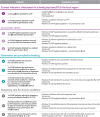Evaluation of the implementation of single points of access for unattached patients in primary care and their effects: a study protocol
- PMID: 36868603
- PMCID: PMC9990645
- DOI: 10.1136/bmjopen-2022-070956
Evaluation of the implementation of single points of access for unattached patients in primary care and their effects: a study protocol
Abstract
Introduction: Attachment to a primary care provider is an important component of primary care as it facilitates access. In Québec, Canada, attachment to a family physician is a concern. To address unattached patients' barriers to accessing primary care, the Ministry of Health and Social Services mandated Québec's 18 administrative regions to implement single points of access for unattached patients (Guichets d'accès première ligne (GAPs)) that aim to better orient patients towards the most appropriate services to meet their needs. The objectives of this study are to (1) analyse the implementation of GAPs, (2) measure the effects of GAPs on performance indicators and (3) assess unattached patients' experiences of navigation, access and service utilisation.
Methods and analysis: A longitudinal mixed-methods case study design will be conducted. Objective 1. Implementation will be analysed through semistructured interviews with key stakeholders, observations of key meetings and document analysis. Objective 2. GAP effects on indicators will be measured using performance dashboards produced using clinical and administrative data. Objective 3. Unattached patients' experiences will be assessed using a self-administered electronic questionnaire. Findings for each case will be interpreted and presented using a joint display, a visual tool for integrating qualitative and quantitative data. Intercase analyses will be conducted highlighting the similarities and differences across cases.
Ethics and dissemination: This study is funded by the Canadian Institutes of Health Research (# 475314) and the Fonds de Soutien à l'innovation en santé et en services sociaux (# 5-2-01) and was approved by the CISSS de la Montérégie-Centre Ethics Committee (MP-04-2023-716).
Keywords: Organisation of health services; PRIMARY CARE; Protocols & guidelines.
© Author(s) (or their employer(s)) 2023. Re-use permitted under CC BY-NC. No commercial re-use. See rights and permissions. Published by BMJ.
Conflict of interest statement
Competing interests: None declared.
Figures




Similar articles
-
Determinants associated with receiving a medical appointment through the primary care access points for unattached adults in Quebec: A cross-sectional study.Healthc Manage Forum. 2025 May;38(3):178-185. doi: 10.1177/08404704241301773. Epub 2024 Nov 24. Healthc Manage Forum. 2025. PMID: 39581885 Free PMC article.
-
CUP study: protocol for a comparative analysis of centralised waitlist effectiveness, policies and innovations for connecting unattached patients to primary care providers.BMJ Open. 2022 Mar 7;12(3):e049686. doi: 10.1136/bmjopen-2021-049686. BMJ Open. 2022. PMID: 35256440 Free PMC article.
-
Organizational innovations related to Primary Care Access Points (GAP) for unattached patients in Quebec: a multi-case qualitative study.BMC Prim Care. 2024 Oct 12;25(1):363. doi: 10.1186/s12875-024-02614-y. BMC Prim Care. 2024. PMID: 39395972 Free PMC article.
-
Healthcare stakeholders' perceptions and experiences of factors affecting the implementation of critical care telemedicine (CCT): qualitative evidence synthesis.Cochrane Database Syst Rev. 2021 Feb 18;2(2):CD012876. doi: 10.1002/14651858.CD012876.pub2. Cochrane Database Syst Rev. 2021. PMID: 33599282 Free PMC article.
-
Connecting unattached patients to comprehensive primary care: a rapid review.Prim Health Care Res Dev. 2023 Mar 15;24:e19. doi: 10.1017/S1463423623000099. Prim Health Care Res Dev. 2023. PMID: 36919838 Free PMC article. Review.
Cited by
-
Single points of access to fill the "GAP" for unattached patients in primary care: What makes paediatric users more likely to require a medical appointment?Healthc Manage Forum. 2024 Jul;37(4):202-209. doi: 10.1177/08404704231215698. Epub 2023 Dec 8. Healthc Manage Forum. 2024. PMID: 38064174 Free PMC article.
References
Publication types
MeSH terms
Grants and funding
LinkOut - more resources
Full Text Sources
Research Materials
Miscellaneous
